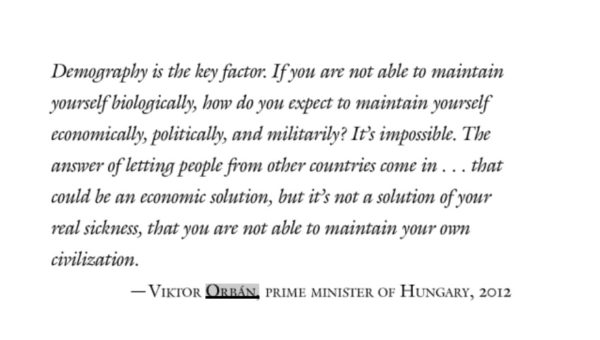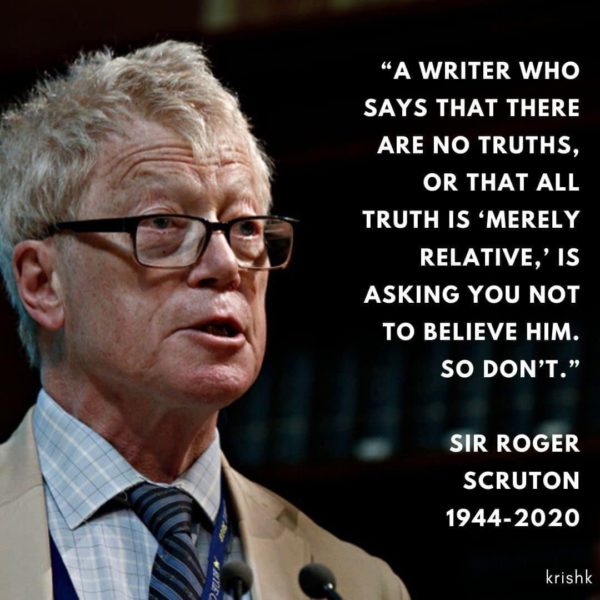The end of the year is often time for “best of the year” and “worst of the year” lists, but most “best of” lists are merely catalogues of one’s preferences and favorite moments, which is fine.
But it’s another case with “worst of the year” lists, and by far the worst article of the year appearing in a supposedly conservative media outlet is Jonathan Last’s October article in The Bulwark, “Roger Scruton and the Fascists Who Love Him.” I had this article on my read-to-comment-later pile when it came out, but then I went away on my long European excursion and fell behind on the pile.
I have tried to maintain cordial relations with my old Weekly Standard friends who have gone on to their successor media outlets, especially The Bulwark. I’ve even placed an article or two there. I have acknowledged the reasonable case at the core of The Bulwark’s outlook that Donald Trump and the broader populist current he galvanized have exerted some negative forces in the Republican Party, though my own balance sheet concludes that Trump was much more sinned-against than sinning, and think the populist turn among conservatives is long overdue and largely healthy. (By the way, someone who thought this a long time ago was . . . Irving Kristol. See below.*)
But it became clear a while ago now that the “Never Trump” disposition has become fanatical to the point that Bulwarkers and others in the same camp have gone nuts, throwing every conservative principle over the side simply because Trump embraced them. But Last—tempting to call him “the Last Man”—really scraped bottom with his clubfooted treatment of Scruton. Much of Last’s article consists of classic “ventriloquist journalism,” citing in a faux-questioning way an article by Alan Elrod (I’ve never heard of him either) in Arc Digital, most of which doesn’t deserve the dignity of a response.
Last fully associates himself with Elrod’s condemnation of the existence of, among other things, two Scruton Cafes in Budapest (both of which I have visited). Some Last excerpts with commentary:
Would Scruton be horrified by all of this? By having his name affixed to a self-consciously revanchist coffeeshop by an aspiring authoritarian? By having fifth-rank, self-proclaimed “anti-liberal” intellectuals acting as if they are the champions of his legacy?
As I said: Scruton was the real deal in terms of intellectual horsepower and he was, by all accounts, a good egg. So it’s nice to think so.
First, Last really shouldn’t be throwing around characterizations of “fifth-rank” intellectuals. Last doesn’t have the intellectual chops to carry Scruton’s jock strap. Full stop.
Second, would Scruton be “horrified” at these tributes to his thought and influence? Well let’s see: Sir Roger’s widow, Sophie, has enthusiastically supported the Scruton project in Hungary, making substantial donations of some of Roger’s most treasured memorabilia and a good portion of his personal library to the two cafes and to Mathias Corvinus Collegium. You’d think a “reporter” like Last might have tried to contact Sophie Scruton to ask her. I suspect she has a better handle on what would “horrify” Roger than Last.
Last implicitly admits he has little familiarity with Scruton’s rich body of work—more than 60 books in addition to countless popular articles (and even a BBC documentary on aesthetics), but somehow feels justified in this summary judgment:
. . . reading Scruton’s critique of liberalism from the safety of, say, 1995, with communism vanquished, liberalism ascendant, and Europe beginning to heal from an 80-year-old wound is one thing.
Stop right here—with the phrase “from the safety of, say, 1995, with communism vanquished. . .” The “safety of 1995” is an amazingly crass and clueless thing to say, given than in the mid- to late-1980s few Western intellectuals were more active than Scruton behind the Iron Curtain championing the liberal tradition. Scruton not only smuggled books into Eastern Europe, but helped run a samizdat-style underground “university” at great personal risk. He was arrested more than once. (He also played in a rock band in Czechoslovakia and elsewhere as a cover of sorts.)
There’s a reason why Scruton is so popular in Eastern Europe today. We should be so lucky as to have a figure capable of inspiring such deep interest among young conservatives. Incidentally, one of Elrod’s slurs is that the Scruton Cafes are spots “for ex-pats” to congregate. That wasn’t my perception on the days I lingered for several hours over coffee or beer working away on my computer: they were a hotbed of traffic by Hungarians of all descriptions.
To continue with the Last Man:
Reading Scruton’s critique of liberalism today, with right-wing illiberalism on the march both at home and abroad, is quite another.
Scruton’s argument in many of his essays and books amounted to a deep critique of liberalism as mistaken about human beings, about society, about politics. That critique was especially valuable when it could be read as a friendly corrective to liberalism’s errors, excesses, and contradictions. But today, with liberalism under threat, it comes across more like an indictment of liberalism—an indictment that has apparently been taken up as a foundational text by fascists.
 Where to begin with such a fatuous passage? I’ll limit myself only to the irony that in his last decade Scruton confessed to having been too tough on Margaret Thatcher’s “market-liberalism” back in the 1980s, and his revised judgment was that she was better than he thought. In other words, if anything Scruton’s attachment to liberalism rightly understood deepened in recent years, and I never heard him—or read him anywhere—thinking that Hungary or any other eastern European nation was lurching into ill-liberalism. (For what it’s worth, I once had a long but entirely congenial argument over dinner with Roger about Leo Strauss, whom he did not care for. He wasn’t hostile or dismissive, but explained his disagreement with Strauss’s critique of liberalism, and some of Strauss’s esoteric methodology. The irony here abounds if you let it sink in for a minute.)
Where to begin with such a fatuous passage? I’ll limit myself only to the irony that in his last decade Scruton confessed to having been too tough on Margaret Thatcher’s “market-liberalism” back in the 1980s, and his revised judgment was that she was better than he thought. In other words, if anything Scruton’s attachment to liberalism rightly understood deepened in recent years, and I never heard him—or read him anywhere—thinking that Hungary or any other eastern European nation was lurching into ill-liberalism. (For what it’s worth, I once had a long but entirely congenial argument over dinner with Roger about Leo Strauss, whom he did not care for. He wasn’t hostile or dismissive, but explained his disagreement with Strauss’s critique of liberalism, and some of Strauss’s esoteric methodology. The irony here abounds if you let it sink in for a minute.)
Second, when did the Bulwarkians become such lazy historicists? In addition to the passage quoted above, Last adds: “We’re all products of our place and time. In Scruton’s place and time, it did seem like liberalism was ascendant and that its overreach and failings needed conservative correction.” (Emphasis added.) Good grief.
The most dismaying thing at work here is to see how Trump Derangement Syndrome has become a parasite in the decayed neoconservative mind, needing new hosts to attach for survival. And hence the need to demonize Orban and Hungary. All of which leads to a final observation. About ten years back Last wrote an excellent book on demographics, entitled What To Expect When No One’s Expecting: America’s Coming Demographic Disaster. Lo and behold, here’s the epigraph for one of the later chapters in Last’s book: Who? WHO?
Who? WHO?
I’ll treat Orban Derangement Syndrome at a later time. (Among other things, I hope to take up the extended but insufficient critique of Claire Berlinski, whom I generally adore). But for the moment I find it the epitome of a lack of self-awareness, if not hypocrisy, for people who voted for Joe Biden to talk about Orban’s alleged corruption, or still more Orban’s direct influence on Hungarian media (the FBI and Twitter anyone?), or his direct support for Mathias Corvinus Collegium. This, in a country where our mass media and colleges are fully partisan adjuncts of one political party. This is insulting to the intelligence. An old line from Ray Bradbury comes to mind: “Every simile that would have made a sub-moron’s mouth twitch – gone!” Pretty much describes the content of The Bulwark on days when they let the term “fascism” start their Pavlovian reflexes twitching.
Chaser:
* P.S.—This passage is one reason why I think if Irving Kristol were still with us, on the whole he’d have approved of Trump, as does his great friend still happily with us, Norman Podhoretz:
What is going on is something very strange and without precedent. To put it simply: The common sense—not the passion, but the common sense—of the American people has been outraged, over the past 20 years, by the persistent un-wisdom of their elected and appointed officials…To the degree that we are witnessing a crisis in our democratic institutions, it is a crisis of our disoriented elites, not of a blindly impassioned populace…This new populism is no kind of blind rebellion against good constitutional government. It is rather an effort to bring our governing elites to their senses. That is why so many people—and I include myself among them—who would ordinarily worry about a populist upsurge find themselves so sympathetic to this new populism.
From Irving Kristol,“The New Populism: Not To Worry,” The Public Interest, 1985!
Chaser #2:



Notice: All comments are subject to moderation. Our comments are intended to be a forum for civil discourse bearing on the subject under discussion. Commenters who stray beyond the bounds of civility or employ what we deem gratuitous vulgarity in a comment — including, but not limited to, “s***,” “f***,” “a*******,” or one of their many variants — will be banned without further notice in the sole discretion of the site moderator.